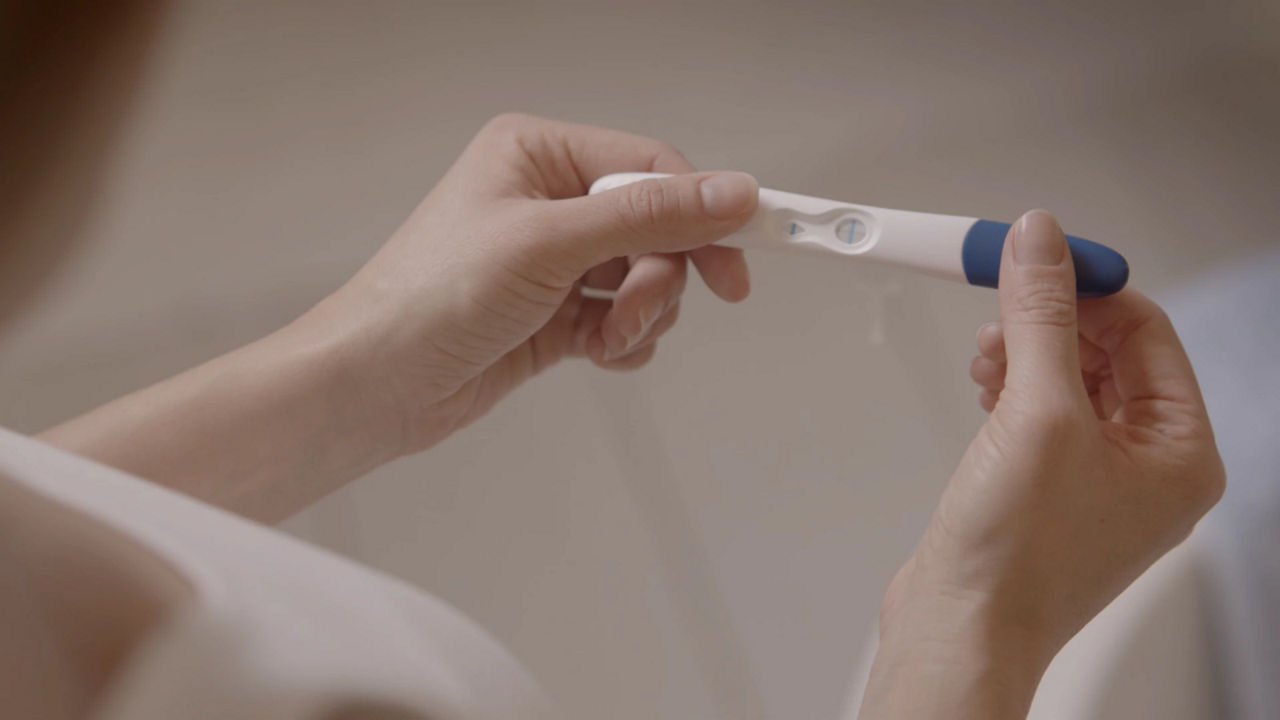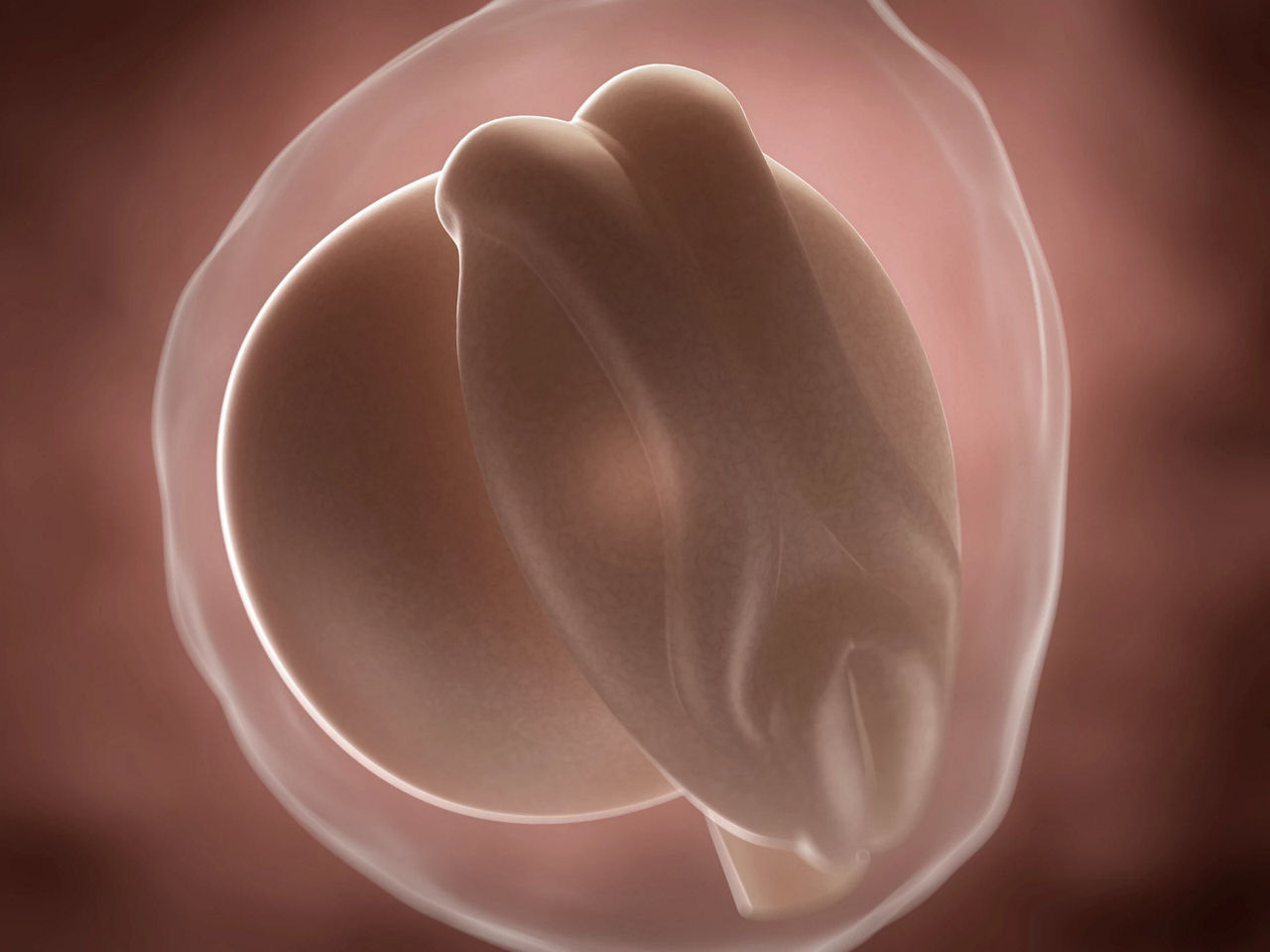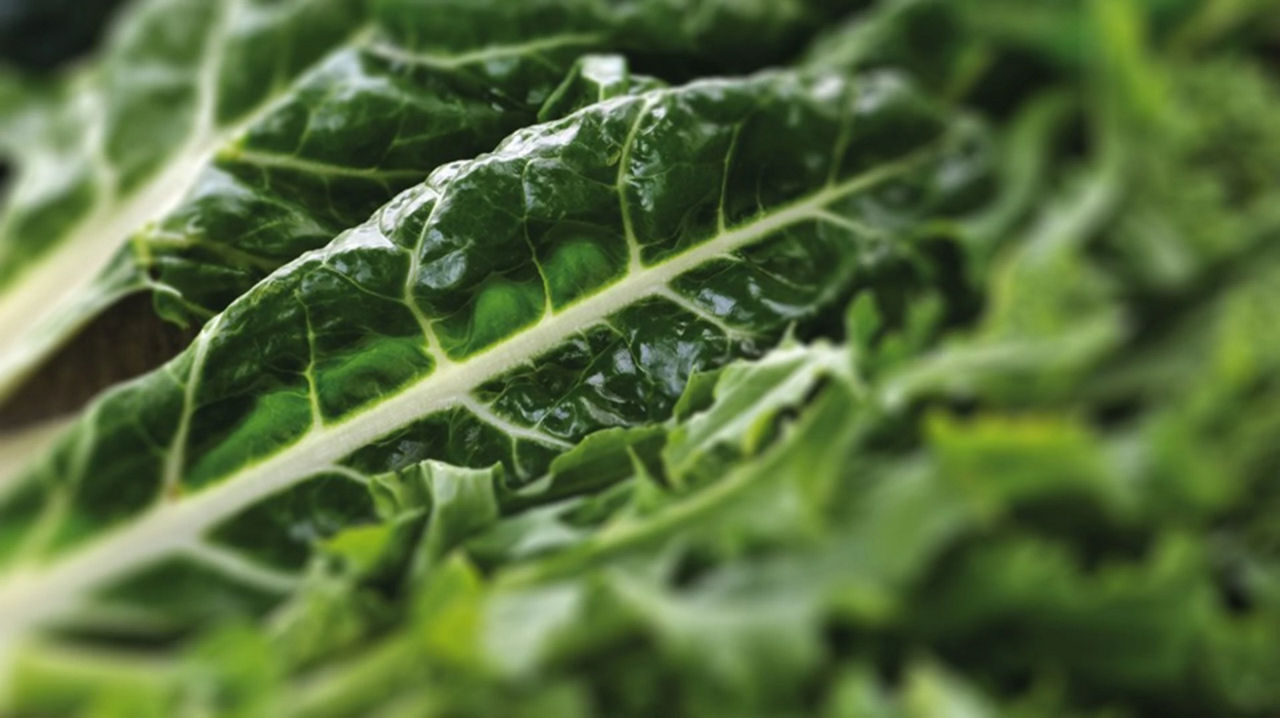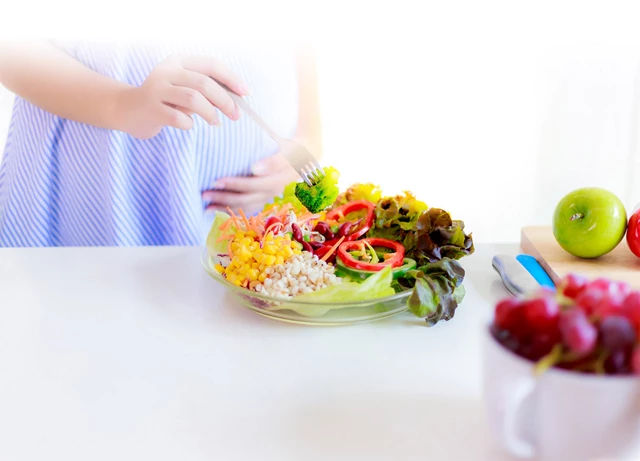Early Signs & Symptoms of Pregnancy: 1-4 Weeks

Explore pregnancy stages week by week
One to four weeks pregnant is how many months?
Month 1 (Trimester 1)
Early signs of pregnancy
As you begin your journey towards parenthood and get ready to meet your baby for the very first time, you might be wondering what to expect—especially when it comes to those well-known pregnancy symptoms.
Whilst many women don’t know that they’re expecting a baby until a few weeks into their pregnancy, others will be able to spot some of the tell-tale signs from as early as 1 week. Here we’ll explore some of the common early signs of pregnancy, including implantation bleeding, mood swings and constipation, as well your baby’s growth in the womb, and when to take a pregnancy test.
Your baby’s growth in the womb: 1 - 4 weeks
This early on in your pregnancy, your newly fertilised egg is made up of a single cell called a ‘zygote’(1). Around 90 hours after fertilisation, the cells within the zygote will divide, and will continue to do so until they form a tiny mass known as a blastocyst. This will then travel from your fallopian tubes to your uterus, where it will implant itself into the lining of your womb to grow and develop(1). Once this happens, your baby will be referred to as an embryo(2).
It’s not uncommon to experience some spotting or light bleeding at around the same time your period would have been due, and this is known as implantation bleeding(3).
Although the early signs of pregnancy (except for perhaps some implantation bleeding) may not have kicked in just yet, there’s plenty going on. In fact, your baby is developing faster now than it will at any other point during your pregnancy(4).

How big is my baby at 1-4 weeks pregnant?
At 4 weeks pregnant, your baby will be around the size of a poppy seed and protected by the amniotic sac, which is filled with cushioning fluid(5). This is attached to a tiny yolk sac that will give your baby the nourishment they need for now. Later on, the outer layer of the sac will become the placenta, providing your baby with vital oxygen and nutrients as your pregnancy progresses(5).
Around 6-10 days after ovulation you may notice some light spotting as the bundle of cells, now known as a blastocyst, attaches to the wall of your womb1.
Symptoms of early pregnancy at 1 - 4 weeks
The symptoms of early pregnancy are often very subtle, and it may be that you’re not noticing any at all right now. Everyone is different. Whilst some women experience the early signs of pregnancy, others won’t experience any symptoms at all. There's really no way to tell what your experience will be.
One of the first and most reliable signs of early pregnancy is a missed period, especially if your menstrual cycle is fairly regular. It’s possible that you’ll also experience some spotting or lighter bleeding at around the time your period would have been due, which is the result of the embryo embedding itself into your uterus(6). At this point, you may be wondering if you’re pregnant and decide to take a pregnancy test.
The hormonal changes you’re going though may also result in mood swings(7) - another common early pregnancy symptom. Be sure to keep an eye on how you’re feeling throughout your pregnancy, as well as after the birth of your baby. Make sure you’re taking care of yourself, and reasting when you need to. If you have any worries at all about your mental and emotional health, always speak to your doctor or midwife. You can learn more about this here.
Some other common symptoms of early pregnancy include (ref):
- Tiredness and fatigue. This is thought to be due to the hormonal changes in your body, and it’s not uncommon to feel tired or even exhausted, especially in the first trimester(8).
- Sore and swollen breasts. One of the early signs of pregnancy, and one that can sometimes be mistaken as being connected with your menstrual cycle. This is because it can often occur just before your period is due to start(6).
- A need to wee more frequently. This is a pregnancy symptom that, in early pregnancy, is thought to be due to the increased levels of the pregnancy hormone human chorionic gonadotrophin (hCG)(9). In later pregnancy, this symptom is usually a result of your growing baby pressing on your bladder. If you also notice a burning sensation when you wee, chills, cloudy wee or blood in your wee, please speak to your doctor as this may indicate a urinary tract infection, sometimes referred to as a UTI(10).
- Changing tastes in food. During your pregnancy, you may find yourself craving foods that you wouldn’t normally eat, and developing a dislike of the ones you do. Whilst it’s been suggested that this might be due to hormonal changes, further research is needed here(8).
- A metallic taste in your mouth. Following on from the above, some women describe experiencing a metallic taste in their mouth in early pregnancy.
- Morning sickness. Perhaps the most well-known pregnancy symptom, morning sickness, usually starts around week 4 and is thought to be caused by pregnancy hormones.
- A milky white discharge from your vagina. It’s perfectly normal to experience an increased level of vaginal discharge during early pregnancy, as this helps to protect your womb from infections. A milky white discharge is healthy, but always speak to your doctor if it becomes itchy and painful, changes colour or smells unpleasant(9).
- Headaches and dizziness. Headaches are a common symptom of early pregnancy and usually improve with time. Try to get plenty or rest to help ease any discomfort. However, headaches can also be a sign of preeclampsia, so if your symptoms get more severe, always seek medical advice(12).
- Cramping. This can sometimes be mistaken for period pain in early pregnancy and is usually nothing to worry about. Cramping can be caused by constipation, bloating and trapped wind, as well as the ligaments in your tummy adapting and changing to support your growing baby(13).
- Acne or changes to your skin. This might include something called chloasma or ‘the mask of pregnancy’, which causes darkened patches of skin on your face.
- Bloating. A common early sign of pregnancy, the pregnancy hormone progesterone is relaxing the muscles in your womb, ready to accommodate your growing baby. As a result, you may feel bloated, and experience excess wind(14).
- Congestion. This is most likely caused by the hormonal changes your body is going through(15).
Whilst the above are all common early pregnancy symptoms, if you’re worried about anything you’re experiencing, don’t hesitate to have a chat with your doctor or midwife so that they can help to put your mind at ease.
Early pregnancy: what changes are happening in your body?
At this point in your pregnancy, it’s unlikely that you’ll look pregnant or have a noticeable baby bump. Most first-time mums don’t start showing until at least week 12, towards the end of the first trimester(5). However, if you’ve been pregnant before, you may start showing a little sooner, as the muscles in your uterus have been stretched by a previous pregnancy.
By week 4, your body is starting to grow the placenta, a brand-new organ that will supply your baby with the oxygen and nutrients needed to grow and develop. The placenta will also ensure that antibodies are passed to your baby, helping them to build a level of resistance to infection in the final stages of pregnancy(16).
Another function of the placenta is hormone production(17). The hormones produced by the placenta support your baby to grow and develop in the womb, helping to maintain a healthy pregnancy. They also support the physical changes that are happening to your body. Progesterone and relaxin, for example, both have a relaxant effect on your muscles, allowing your uterus to adapt and make room for your growing baby(18).

Can you feel pregnant before you miss a period?
It’s unlikely that you’ll feel pregnant before you miss a period, especially if your menstrual cycle is regular and reliable. In all likelihood, you’re more likely to start experiencing some of the early signs of pregnancy when the ‘pregnancy hormone’ human chorionic gonadotrophin (hCG) starts to become active(5).
How soon should I take a pregnancy test?
Most pregnancy tests will provide a reliable result from the first day of your missed period. However, if your menstrual cycle is irregular, then the NHS advises that you take a pregnancy test 21 days after having unprotected sex(19). You may want to try a home pregnancy test that you can use before you’ve even missed a period.
When it comes to which pregnancy test to use, there are plenty of choices available. As long as you use them correctly and follow the instructions, home pregnancy tests are accurate and reliable.
When should I call my doctor about a new pregnancy?
Once a pregnancy test has confirmed that you’re pregnant, you should make an appointment to see your doctor or midwife. That way you can ensure that you’re getting the antenatal care you need for a healthy pregnancy as soon as possible(20).
The first appointment with your midwife is known as a ‘booking appointment’ and will usually happen before you reach week 10 of your pregnancy(21). During the appointment, your midwife will ask you some questions, which will help them learn more about you and your circumstances. They’ll also(21):
- Take blood tests so that they can check your health and find out your blood group, as well as to test for certain conditions such as HIV or hepatitis B
- Take height and weight measurements
- Check your urine for any sign of preeclampsia and check your blood pressure
Your midwife may also discuss things like a healthy pregnancy diet, exercise during your pregnancy, and the type of birth you’re planning to have. Remember that this is also an opportunity for you to ask any questions that you might have.
Early pregnancy diet
Reviewed by Bahee van de Bor
You won’t need to follow a special or particular diet during your pregnancy unless you’ve been advised to do so by your doctor or midwife(22). The important thing is to ensure that you’re eating a variety of different foods every day, as that’s the best way to ensure that you and your baby are getting all of the vitamins and minerals you need.
From the moment you find out that you’re pregnant, or if you’re trying for a baby, there are certain foods that you’ll need to either avoid entirely or reduce the amount you eat. This includes things like:
- Raw and uncooked meat
- Unpasteurised milk and certain cheeses
- Foods that contain a high level of vitamin A(23).
Read more about the foods you’ll need to avoid in pregnancy here.
It’s also important to ensure that you’re taking a folic acid supplement every day - the recommended intake is 400mcg. Folic acid supports the development of your baby’s nervous system and can help to protect against spina bifida(24). We cover the importance of folic acid in more detail in week 5.
Vitamin C in pregnancy
Vitamin C is a vital nutrient in the first 4 weeks of pregnancy. Not only does it play an important role in keeping cells healthy, it’s also needed to make collagen, one of the fibres which supports the normal growth of bones, teeth and tendons. It also helps with the healing process if you’ve had a wound(25).
The recommended intake of vitamin C during pregnancy is 50mg per day(26), and you can get all the vitamin C you need to support you and your baby by eating a well-balanced diet that includes plenty of fruit and vegetables(27).
Here are some ways you can include vitamin C in your diet:
- One medium orange (100g) provides 50mg of vitamin C
- A portion of broccoli (80g) provides 70mg of vitamin C
- A portion of bell peppers (80g) provides 64 mg of vitamin C
Vitamin C supports the immune system by keeping cells healthy and helping wounds to heal6.
Vitamin C and Iron during pregnancy
Vitamin C also helps the body to absorb iron(28). This is very important during pregnancy, as iron helps to support the development of your baby’s cognitive function(29), as well as ensuring that they get the necessary nutrients and oxygen from the bloodstream(30).
It’s not uncommon for pregnant women to experience an iron deficiency, which is why it’s important to get plenty of it from your diet. Iron can be found in a number of foods, including(30):
- Red meat.
- Beans and pulses.
- Green leafy vegetables
If you’re concerned about your iron levels, speak with your doctor or midwife who can provide you with further advice.
How much weight should I gain during early pregnancy?
As a rule of thumb, pregnant women gain anywhere between 10 and 12.5kg during their pregnancy(31). Most of this weight gain will happen after week 20 as your baby gets bigger and your body prepares for breastfeeding.
It’s not advisable for you to go on a diet or restrict your food intake during pregnancy. Rest assured that as long as your doctor and midwife are happy with your weight and how your pregnancy is progressing, all you need to do is make sure that you’re eating a healthy and balanced diet full of a variety of foods.
- Khan YS, Ackerman KM. Embryology, Week 1. [Updated 2023 Apr 17]. In: StatPearls [Internet]. Treasure Island (FL): StatPearls Publishing; 2023 Jan-. Available from: https://www.ncbi.nlm.nih.gov/books/NBK554562/
- NHS Inform. How your baby develops week to week: The first 8 weeks [online] 2023. [Accessed January 2024]
- NHS. Vaginal bleeding [online] 2021. Available at https://www.nhs.uk/pregnancy/related-conditions/common-symptoms/vaginal-bleeding/#:~:text=To%20work%20out%20what%20is,out%20what%20caused%20the%20bleeding. [Accessed January 2024]
- NHS Inform. How your baby develops week to week: The first 8 weeks [online] 2023. Available at https://www.nhsinform.scot/ready-steady-baby/pregnancy/your-baby-s-development/how-your-baby-develops-week-to-week/#:~:text=By%20week%205%20their%20heart,lungs%20have%20started%20to%20grow. [Accessed January 2024]
- NHS Start for Life. Pregnancy Week 4 [online]. Available at https://www.nhs.uk/start-for-life/pregnancy/week-by-week-guide-to-pregnancy/1st-trimester/week-4/. [Accessed January 2024]
- NHS. Signs and symptoms of pregnancy [online] 2022. Available at https://www.nhs.uk/pregnancy/trying-for-a-baby/signs-and-symptoms-of-pregnancy/#:~:text=Sore%20breasts%20in%20early%20pregnancy,may%20darken%20and%20stand%20out. [Accessed January 2024]
- National Childbirth Trust. Emotions during pregnancy [online 2022] Available at https://www.nct.org.uk/pregnancy/how-you-might-be-feeling/emotions-during-pregnancy. [Accessed January 2024]
- Orloff NC, Hormes JM. Pickles and ice cream! Food cravings in pregnancy: hypotheses, preliminary evidence, and directions for future research. Front Psychol. 2014 Sep 23;5:1076. doi: 10.3389/fpsyg.2014.01076. PMID: 25295023; PMCID: PMC4172095.
- Katharine L. Cheung, Richard A. Lafayette, Renal Physiology of Pregnancy, Advances in Chronic Kidney Disease, Volume 20, Issue 3, 2013, Pages 209-214, ISSN 1548-5595, https://doi.org/10.1053/j.ackd.2013.01.012.
- https://www.nhs.uk/conditions/urinary-tract-infections-utis/#:~:text=See%20a%20GP%20if%3A&text=you're%20pregnant%20and%20have,not%20improve%20within%202%20days
- NHS. Vaginal discharge in pregnancy [online] 2021. Available at https://www.nhs.uk/pregnancy/related-conditions/common-symptoms/vaginal-discharge/#:~:text=When%20you're%20pregnant%2C%20it's,and%20should%20not%20smell%20unpleasant.[Accessed January 2024]
- NHS. Headaches in pregnancy [online] 2021. Available at https://www.nhs.uk/pregnancy/related-conditions/common-symptoms/headaches/. [Accessed January 2024]
- NHS. Stomach pain in pregnancy [online] 2021. Available at https://www.nhs.uk/pregnancy/related-conditions/common-symptoms/stomach-pain/#:~:text=Stomach%20(abdominal)%20pains%20or%20cramps,a%20poo%20or%20pass%20wind. [Accessed January 2024]
- NHS Start for Life. Pregnancy week 10 [online]. Available at https://www.nhs.uk/start-for-life/pregnancy/week-by-week-guide-to-pregnancy/1st-trimester/week-10/. [Accessed January 2024]
- NHS. Non-allergic rhinitis [online] 2021. Available at https://www.nhs.uk/conditions/non-allergic-rhinitis/. [Accessed January 2024]
- NHS. How long do babies carry their mother's immunity? [online] 2021. Available at https://www.nhs.uk/common-health-questions/childrens-health/how-long-do-babies-carry-their-mothers-immunity/. [Accessed January 2024]
- Napso T, Yong HEJ, Lopez-Tello J, Sferruzzi-Perri AN. The Role of Placental Hormones in Mediating Maternal Adaptations to Support Pregnancy and Lactation. Front Physiol. 2018 Aug 17;9:1091. doi: 10.3389/fphys.2018.01091. PMID: 30174608; PMCID: PMC6108594.
- You and your hormones, Placenta [Online] 2021. Available at: https://www.yourhormones.info/glands/placenta/. [Accessed January 2024].
- NHS. Doing a pregnancy test [online 2022]. Available at https://www.nhs.uk/pregnancy/trying-for-a-baby/doing-a-pregnancy-test/. [Accessed January 2024]
- NHS. Finding out you're pregnant [online 2022]. Available at https://www.nhs.uk/pregnancy/finding-out/finding-out-you-are-pregnant/#:~:text=You%20should%20contact%20your%20GP,to%20have%20a%20healthy%20pregnancy. [Accessed January 2024]
- NHS. Your first midwife appointment [online 2022]. Available at https://www.nhs.uk/pregnancy/finding-out/your-first-midwife-appointment/. [Accessed January 2024]
- NHS. Have a healthy diet in pregnancy [online 2023]. Available at https://www.nhs.uk/pregnancy/keeping-well/have-a-healthy-diet// [Accessed January 2024]
- NHS. Foods to avoid in pregnancy [online] 2023. Available at https://www.nhs.uk/pregnancy/keeping-well/foods-to-avoid/. [Accessed January 2024]
- NHS Start for LIfe. Pregnancy week 5 [online]. Available at https://www.nhs.uk/start-for-life/pregnancy/week-by-week-guide-to-pregnancy/1st-trimester/week-5/#look-like. [Accessed January 2024]
- NHS Islington Primary Care Trust. Vitamins and minerals for children from 1 - 5 years olf [online] 2008. Available at https://www.whittington.nhs.uk/document.ashx?id=6216#:~:text=Vitamin%20C%20is%20important%20for,also%20important%20in%20wound%20healing. [Accessed January 2024]
- British Nutrition Foundation. Nutrition Requirements [Online] 2016. Available at https://www.nutrition.org.uk/attachments/article/234/Nutrition%20Requirements_Revised%20Oct%202016.pdf. [Accessed January 2024]
- NHS. Vitamin C [online] 2020. Available at https://www.nhs.uk/conditions/vitamins-and-minerals/vitamin-c/. [Accessed January 2024].
- NHS. Vitamins for children [online] 2021. Available at https://www.nhs.uk/conditions/baby/weaning-and-feeding/vitamins-for-children/. [Accessed January 2024]
- McCann S, Perapoch Amadó M, Moore SE. The Role of Iron in Brain Development: A Systematic Review. Nutrients. 2020 Jul 5;12(7):2001. doi: 10.3390/nu12072001. PMID: 32635675; PMCID: PMC7400887.
- British Nutrition Foundation. Nutrition during pregnancy [online] 2015. Available at https://www.nutrition.org.uk/life-stages/pregnancy/healthy-eating-during-pregnancy/nutrition-during-pregnancy/#:~:text=Your%20body%20needs%20extra%20iron,iron%20as%20the%20pregnancy%20progresses. [Accessed January 2024]
- NHS. Weight gain in pregnancy [online] 2020. Available at https://www.nhs.uk/pregnancy/related-conditions/common-symptoms/weight-gain// [Accessed January 2024]
related articles
Read More

Need some help?
You can get quick answers to common questions in our FAQs.
Alternatively, if you need help with general pregnancy or baby advice, or maybe on using or ordering our products - our expert team are always on hand to talk about feeding your baby.
- Deans A. Your New Pregnancy Bible, The experts’ guide to pregnancy and early parenthood. 4th ed.London: Carroll & Brown Publishers Limited, 2013. p.14.
- NHS. Start 4 Life. 1st trimester, week 4 [Online]. Available at: https://www.nhs.uk/start4life/pregnancy/week-by-week/1st-trimester/week-4/ [Accessed October 2019].
- NHS. What is the placenta? [Online]. Available at: https://www.nhs.uk/common-health-questions/pregnancy/what-is-the-placenta/ Page last reviewed: 3 September 2018.Next review due: 3 September 2021.
- You and your hormones, Placenta [Online]. Available at: https://www.yourhormones.info/glands/placenta/ Page last reviewed: February 2018.
- NHS. Signs and symptoms of pregnancy [Online]. Available at: https://www.nhs.uk/conditions/ pregnancy-and-baby/signs-and-symptoms-pregnancy/ Page last reviewed: 8 October 2019. Next review due: 8 October 2022.
- Maggini S et al. Essential Role of Vitamin C and Zinc in Child Immunity and Health. J Int Med Res 2010; 38: 386 - 414.
- NHS. Vitamins for children [Online]. Available at: https://www.nhs.uk/Conditions/pregnancy-and-baby/Pages/vitamins-for-children.aspx Page last reviewed: 1 February 2018. Next review due: 1 February 2021.
- British Nutrition Foundation. Vitamins [Online]. Available at: https://www.nutrition.org.uk/nutritionscience/nutrients-food-and-ingredients/vitamins.html?start=12 Page created July 2009. Revised February 2016.
- NHS. Iron [Online]. Available at: https://www.nhs.uk/conditions/vitamins-and-minerals/iron/ Page last reviewed: 3 March 2017. Next review due: 3 March 2020. 10
- British Nutrition Foundation. Nutrition Requirements [Online]. Available at: https://www.nutrition.org.uk/attachments/article/234/Nutrition%20Requirements_Revised%20Oct%202016.pdf Last reviewed: Oct 2016. Next review due: Oct 2019.
- NHS. Vitamins, supplements and nutrition in pregnancy, Vitamin C [Online]. Available at: https://www.nhs.uk/conditions/pregnancy-and-baby/vitamins-minerals-supplements-pregnant/ Page last reviewed: 26 January 2017. Next review due: 26 January 2020.
- NHS choices. How much weight will I put on during my pregnancy? [Online]. Available at: https://www.nhs.uk/chq/Pages/2311.aspx?CategoryID=54 Page last reviewed: 18 October 2018. Next review due: 18 October 2021.Last reviewed: 9th September 2016
Last reviewed: 13th May 2022
Reviewed by Nutricia’s Medical and Scientific Affairs Team




